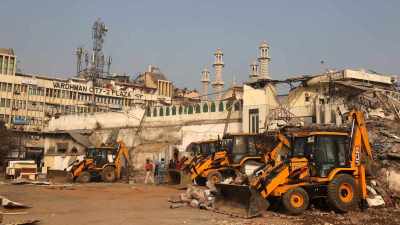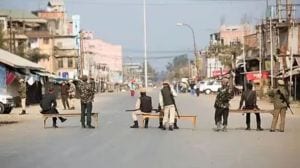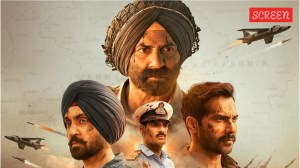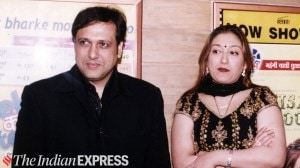Strongman politics
Chalo aao tum to dikhaye hum go bacha hai maqtal-i shehr meinCome, I will show to you what8217;s left in the city8217;s slaughter house. A...

Chalo aao tum to dikhaye hum go bacha hai maqtal-i shehr mein
Come, I will show to you what8217;s left in the city8217;s slaughter house.
A huge board outside the airport welcomes you to Ahmedabad. The drivKe through its different areas was uneventful, giving one the distinct impression that the city was slowly limping back to normalcy. But one couldn8217;t help recounting the gory happenings since the Godhra tragedy 8212; the burning of homes and the brutal murder of several thousand innocent Muslims.
Just as Joseph Goebbels incited the Kristallnacht riots The Night of the Broken Glass in Berlin, so did Narendra Modi watch passively while mosques and Sufi shrines were set on fire and Muslim businesses vandalised. Walking through some of the riot-torn areas, I realised how the Muslim victims were threatened so totally and pursued so relentlessly.
That day, the Congress and the BJP released their first list of candidates for the December 12 elections. But one did not see any feverish election activity. All one saw were a few freshly painted hoardings, and some party flags fluttering.
My conversation with politicians of all hues did not take me very far. Discreet and cagey, they refused to comment on whether or not the Modi regime showed itself capable of mass murder. Surely, I said to a local BJP politician, Gujarat cannot restore its pride through religious incitement and communal mobilisation. What8217;s the purpose of Gaurav Yatras when a society8217;s social fabric is so brutally torn apart? Pride in what? In killing the Miyans, who have been tied to the land for centuries? In destroying business and trade? My questions were greeted with silence.
I asked a group of Congress supporters: whom will you invoke during the campaign? 8216;Vallabhbhai Patel8217;, they replied in unison. Fair enough. Gujarat8217;s strongman was a leading figure in politics. The hero of Bardoli Satyagraha was a fervent nationalist, an administrator of considerable merit, and Gandhiji8217;s trusted lieutenant. He stood for the country8217;s unity and integration, for which he earned the nation8217;s grateful thanks.
Doubtless, he championed communitarian causes. However, on one critical issue he conceded that the Ayodhya controversy, started in 1949 with an installation of an idol of Lord Rama in the Babri Masjid, had been raised at a most inopportune time both from the point of view of the country at large and of Uttar Pradesh in particular. We salute his memory.
Yet, free India8217;s first home minister could sometimes relapse into his old attitude of suspecting Muslim loyalty. He removed Muslim officials who had opted to stay in India, resisted Nehru8217;s efforts to reserve certain residential areas for Muslims, and opposed his suggestion of employing Muslims to deal with Muslim refugees.
To him, India8217;s Muslims were hostages to be held in security for the treatment of Hindus in Pakistan. Mere declarations of loyalty to the Indian Union, he said at Lucknow on January 6 1948, were not going to serve any purpose: 8216;only practical proof8217; will do. He told Muslims: 8216;you cannot ride on two horses. You select one horse, whichever you like best8217;. Isn8217;t Narendra Modi, self-proclaimed heir to the Sardar8217;s legacy, saying the same?
This is not all. Patel set a test for the Muslims during the by-election campaign for the Lucknow Assembly seat. He warned that a Hindu state would become inevitable instead of a secular democratic state, if the Muslims continued to conduct 8216;communal8217; politics. He added: 8216;You do not know what it is costing the government to protect you.8217;
In January 1948, he expressed unhappiness over the fact that some of his Congress colleagues wanted to crush the RSS with a danda. 8216;After all,8217; he stated, 8216;RSS men are not thieves and dacoits. They are patriots. They love their country. Only their trend of thought is diverted. They are to be won over by Congressmen with love.8217;
Patel could not stand Maulana Azad, Rafi Ahmed Kidwai, and Nehru, 8216;the one and only nationalist Muslim8217;. Amidst the general collapse of order and murderous violence raging in Punjab, Uttar Pradesh and Bengal, he spewed venom against the Jamiyat al ulama, an organisation of Muslim divines who made huge sacrifices for the cause of freedom, and unequivocally rejected the demand for Partition.
The home minister, however, found the same organisation more dangerous than the Muslim League. He also chastised Azad for being untrustworthy, 8216;despicable8217;, and 8216;dangerous8217;. He accused Rafi of accepting bribes. What is more, he charged Asaf Ali, husband of Aruna Asaf Ali, for being in the British government8217;s pay.
Outside party and government circles, he and his right wing Hindu allies widely portrayed the image of a nation torn between hostile, segregated Muslim groups. They tolerated particularistic affinities when confined to the private sphere, but rejected it as a basis for both legal rights and status as a principle of state policy.
The very vocabulary upon which to articulate and negotiate claims for cultural and political recognition 8212; 8216;minorities8217;, 8216;communities8217;, and 8216;pluralism8217; 8212; ran directly contrary to their notions of nation, citizenship, equal rights, and social equity.
Returning to the group in Ahmedabad, let me add that not one person made even a passing reference to Gandhiji or Jawaharlal Nehru, the principal architects of the great Congress movement. One understands why they are anathema to the sangh parivar.
But it is disturbing to discover that the Congress in Gujarat has chosen to discard them during electioneering. This is a serious error of judgement. Even if the tide turns against the Congress, it is vitally important to invoke shared traditions and religious plurality, and to remind people of the values that Gandhi and Nehru stood for during their public life.
It is necessary, even if it is inexpedient at this juncture, to reach out to them with their message of inter-community harmony. It8217;s worth the gamble; I believe it will pay off. The smiling faces of these charismatic figures may well soothe inflamed passions in Gujarat and instil a measure of confidence in the minorities, Dalits, Christians, tribals, Scheduled Castes, and the OBCs.
Write to mushirulhasanexpressindia.com
- 01
- 02
- 03
- 04
- 05






























